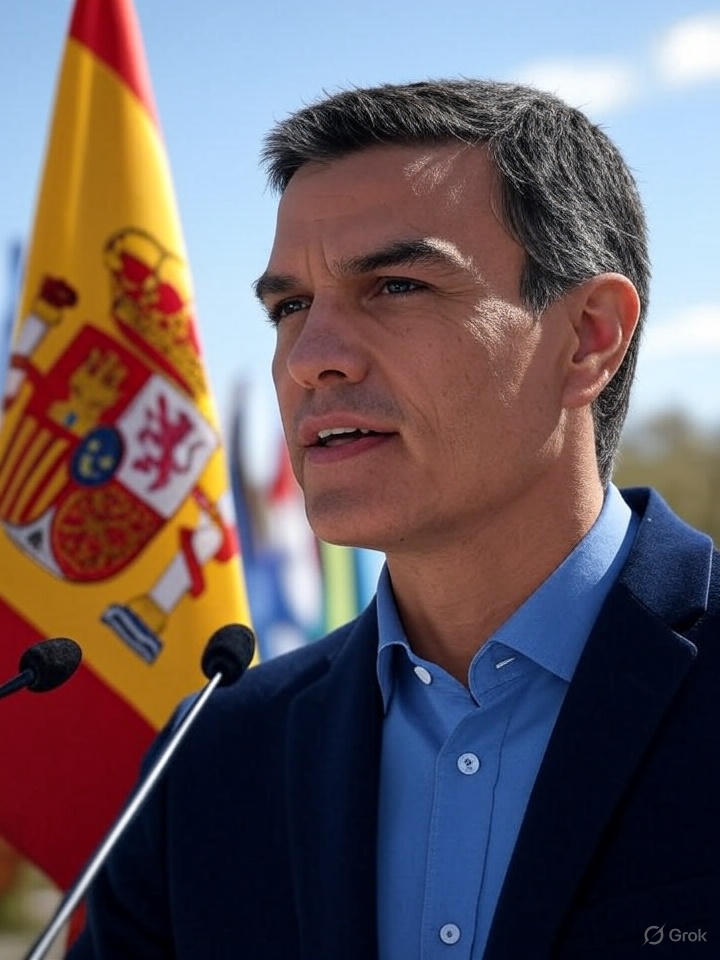Spanish Prime Minister Pedro Sánchez has sparked a heated exchange with Israeli Prime Minister Benjamin Netanyahu following comments made during a recent international forum on the Gaza conflict. Sánchez expressed profound regret over the ongoing humanitarian situation in Gaza, stating that if Spain possessed nuclear capabilities, they would have been utilized to halt the violence and protect civilian lives. This remark, delivered in the context of broader discussions on global security and mediation efforts, prompted an immediate and forceful response from Netanyahu, who characterized Sánchez’s words as a ”genocidal threat” directed against Israel. Netanyahu’s office issued a statement condemning the language as inflammatory and contrary to diplomatic norms, emphasizing Israel’s right to self-defense while calling for restraint in international rhetoric. The Spanish government swiftly rebutted the accusation, with Foreign Minister José Manuel Albares affirming that Sánchez’s intention was to underscore the urgency of de-escalation and humanitarian aid delivery, not to endorse aggression. Madrid’s diplomatic channels activated protocols for clarification, dispatching notes verbales to Israeli counterparts and engaging European Union partners to contextualize the prime minister’s position within Spain’s longstanding advocacy for multilateral solutions in the Middle East. This incident unfolds amid Spain’s active role in regional diplomacy, including its recognition of Palestinian statehood alongside Ireland and Norway, aimed at fostering a two-state framework. Sánchez’s administration has consistently supported United Nations resolutions calling for ceasefires and increased aid corridors, aligning with efforts by the international community to address the crisis. In response to the exchange, both nations’ embassies have maintained open lines of communication, with scheduled consultations to prevent further escalation. Netanyahu reiterated Israel’s commitment to targeted operations against threats while welcoming dialogue on civilian protection measures. On the Spanish side, the government has leveraged the moment to amplify calls for enhanced EU involvement, proposing joint funding for reconstruction projects in Gaza once stability is achieved. This includes commitments to €50 million in immediate humanitarian assistance, channeled through organizations like the Red Cross and UNRWA, focusing on medical supplies, water infrastructure, and shelter provisions. The episode has also prompted internal briefings within the Spanish Congress, where bipartisan support emerged for reinforcing diplomatic outreach to bridge divides. Outcomes from this diplomatic flare-up include accelerated coordination among Mediterranean allies, with Spain hosting a virtual summit involving France, Italy, and Greece to harmonize positions on Middle East policy. The event yielded agreements on shared intelligence-sharing platforms for monitoring aid flows and a unified statement urging all parties to prioritize negotiations. Domestically, Sánchez’s remarks have galvanized public engagement, with civil society groups organizing information sessions on conflict resolution, drawing participation from over 10,000 citizens nationwide. Polling data from independent firms indicates sustained approval for Spain’s proactive foreign policy, with 62 percent of respondents viewing the government’s stance as a constructive contribution to global peace efforts. Furthermore, the tensions have highlighted opportunities for economic diplomacy, as Spain explores expanded trade ties with Israel in non-contentious sectors like renewable energy and cybersecurity. Bilateral business forums, previously paused, are resuming with agendas centered on collaborative ventures that could generate up to €200 million in joint investments over the next five years. Educational exchanges have also been bolstered, with scholarships for joint research programs in water management and agriculture, benefiting 500 students annually. The Spanish Ministry of Foreign Affairs has established a dedicated task force to monitor rhetorical impacts on bilateral relations, ensuring future statements align with de-escalatory principles. On the international stage, the EU’s High Representative for Foreign Affairs has commended both leaders for their rapid engagement, facilitating a trilateral call that outlined pathways for confidence-building measures. This includes proposals for observer status in ongoing talks and technical support for border stabilization initiatives. Within Spain, the incident has spurred legislative advancements, with the passage of a resolution endorsing increased funding for international mediation bodies, allocating an additional €30 million to the EU’s peacebuilding fund. Community leaders across Spain have praised the government’s transparency, leading to heightened volunteerism in solidarity campaigns that have raised awareness and funds for affected populations. The broader implications extend to Spain’s positioning within NATO and the UN Security Council, where its advocacy has earned endorsements from key partners for balanced approaches to conflict zones. Sánchez’s team has integrated lessons from this exchange into training modules for diplomats, enhancing skills in nuanced communication. Economically, the focus on diversification has resulted in new memoranda of understanding with Israeli firms for tech transfers, projected to create 1,200 jobs in Spain’s innovation hubs. Public discourse has shifted toward constructive dialogue, with media outlets hosting forums that promote understanding of diverse perspectives, fostering a more informed electorate. As relations stabilize, both countries anticipate collaborative participation in upcoming global summits, such as the G20, where joint panels on sustainable development could pave the way for normalized interactions. Spain’s proactive stance continues to shape its role as a bridge-builder in Europe, contributing to frameworks that prioritize human rights and security. This episode, while challenging, has ultimately reinforced commitments to dialogue, positioning Spain as a steadfast player in pursuing equitable resolutions to enduring conflicts.
www.34news.online
www.34news.online

